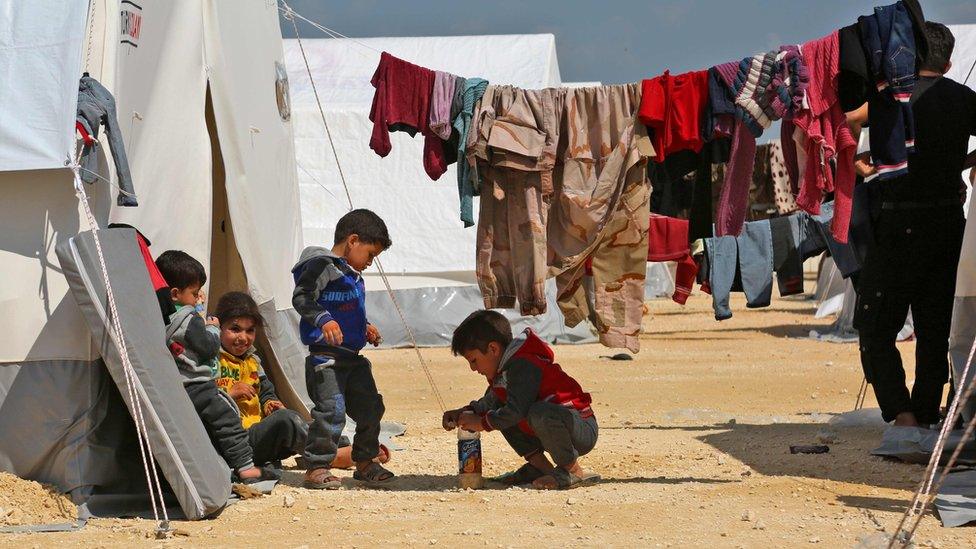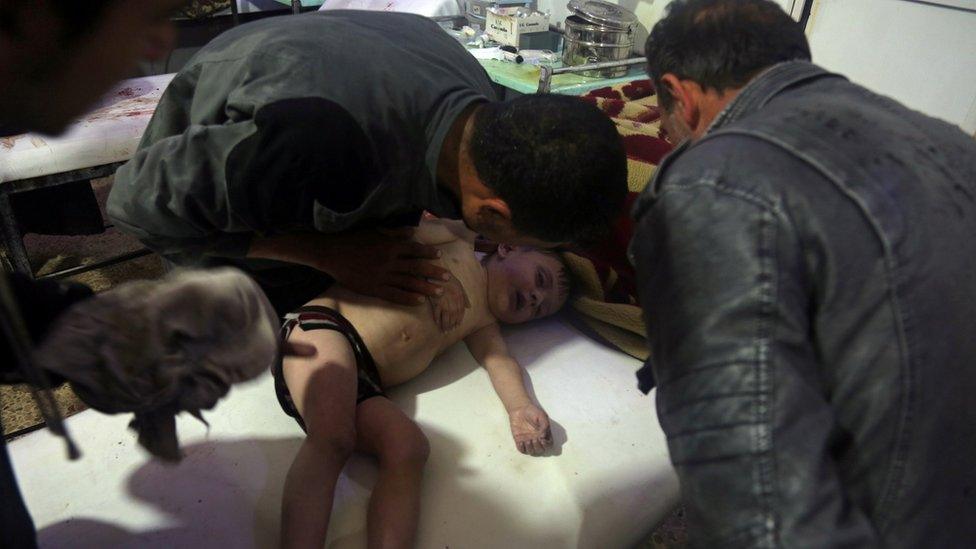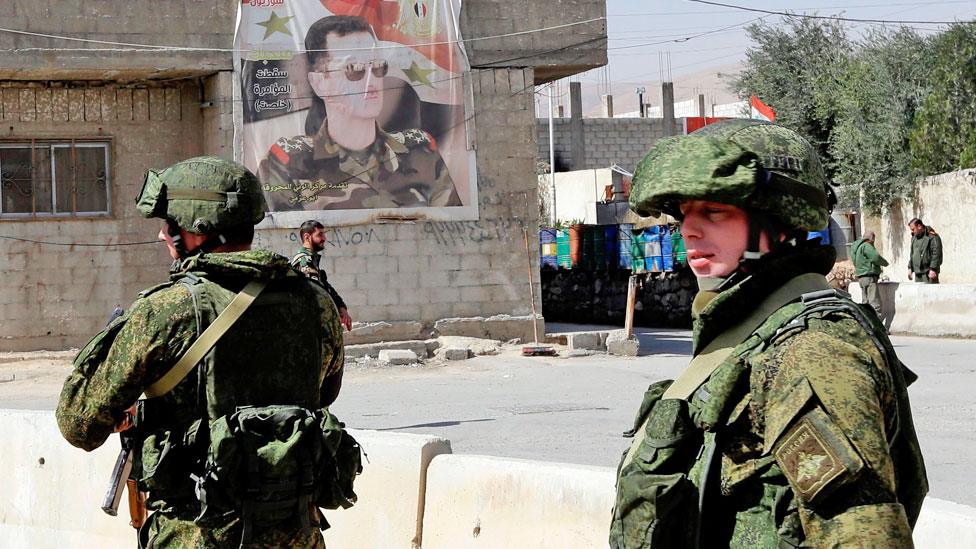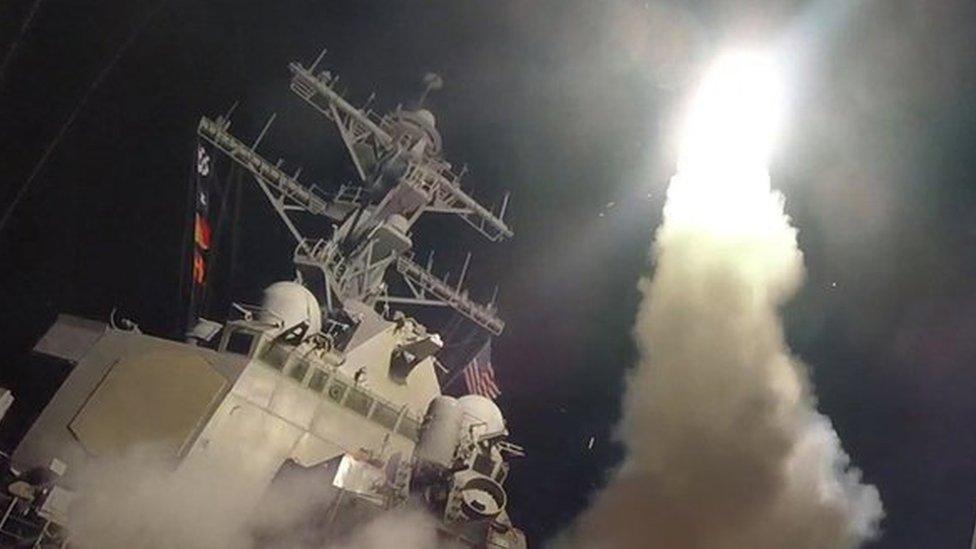Syria crisis: Your questions answered
- Published

Many Syrian families have been displaced since the attack
Following the suspected chemical weapons attack in Douma in Syria on Saturday, a political blame game has ensued between Russia, Syria, the United States, France and the UK.
Russia has warned of the "danger of war" over Syria. France's President Macron said he had "proof" that the Syrian government carried out the attack.
Many people are asking how the international community got to this point and what happens next. BBC world affairs Correspondent Paul Adams has tackled some of the questions sent in by readers:
What is the 'motive' for this attack? Douma was surrounded on all sides by the Syrian army, it would've taken days for the rebels to be defeated, so why drop a chemical weapon?
Eastern Ghouta has been falling for months and the collapse of Douma - the last rebel stronghold - was imminent. A Russian-brokered deal to evacuate rebel fighters and their families had already been reached before the alleged attack took place. So on the face of it, the use of a chemical weapon seems unnecessary and, from the Syrian regime's point of view, counter-productive.
Has the Syrian military grown complacent about the use of chemical weapons, knowing that they rarely seem to elicit any western response? Western officials say the Assad regime has become quite skilled at knowing when and how to use these weapons, in ways that do not trigger widespread outrage.
Was the Douma attack a failure of judgement? We don't know.

Is it possible this was a last ditch effort by rebels to draw an attack on Assad?
It's possible, but seems unlikely. Two months ago, Russia's Chief of the General Staff, Valery Gerasimov, said he had "reliable" information that rebels would do something of this kind.
But just as people wonder why the Syrian regime would launch such an attack when Douma was about to fall anyway, you have to ask why the rebels would wait so long - way beyond the point where the final collapse of Eastern Ghouta could be prevented.
The West has not shown the slightest desire to stop the Assad regime retaking control of Eastern Ghouta.
What can possibly be achieved by more bombing?
It seems clear this is not an attempt to influence the course of the Syrian civil war. This is about chemical weapons, and the growing concern of western powers, in the wake of Douma and Salisbury, that the use of such prohibited weapons is in danger of becoming normalised.
So if military action begins, expect US, British and French forces to target Syria's chemical weapons laboratories, production sites and delivery systems.
If Russia was pushed into a corner it might use nuclear weapons and if America lost a ship it might retaliate with nuclear weapons. Are we a long way from that or is this a real risk?
We're a very long way from this indeed, but that doesn't mean this is not a dangerous moment. Nobody wants to see the US and Russia come to blows over Syria. For all the rhetoric, there's little real sign the Russians and Americans want it to happen either.
The Russian ambassador to Lebanon did appear to threaten western ships and planes, in an interview earlier in the week. But he was speaking in Arabic to a pro-Syrian TV station. He was, perhaps, speaking to a very particular audience.
Both countries have conducted military operations in Syria for the past few years - mostly in the context of the campaign against so-called Islamic State. But in that case, they shared overlapping goals. Now they're on opposing sides.
If one side were to hit the other, deliberately or accidentally, then events could spiral out of control. The Russians say channels of communication, opened during the war against IS, are still open. Let's hope they're being used.

Medical and rescue organisations say most victims of the 'chemical attack' were children and women
Why is Nato not working as an alliance, wasn't it originally formed to solve issues around the world together and keep peace or have they forgotten?
Nato is not a global peacekeeping force. It's a military alliance, constructed around the principle of collective defence. Of course, it has been used in the past to intervene in conflicts which don't pose a direct threat to the alliance, such as Libya in 2011, but it doesn't automatically follow that this would happen this time.
Given that one Nato member, Turkey, is already heavily involved in a separate part of the Syrian conflict - its forces are still fighting against Kurdish rebels in the northern region of Afrin - any attempt to involve Nato in an attack on Syria's chemical weapons facilities would be fraught with political difficulties.
- Published13 April 2018

- Published2 May 2023

- Published12 April 2018
